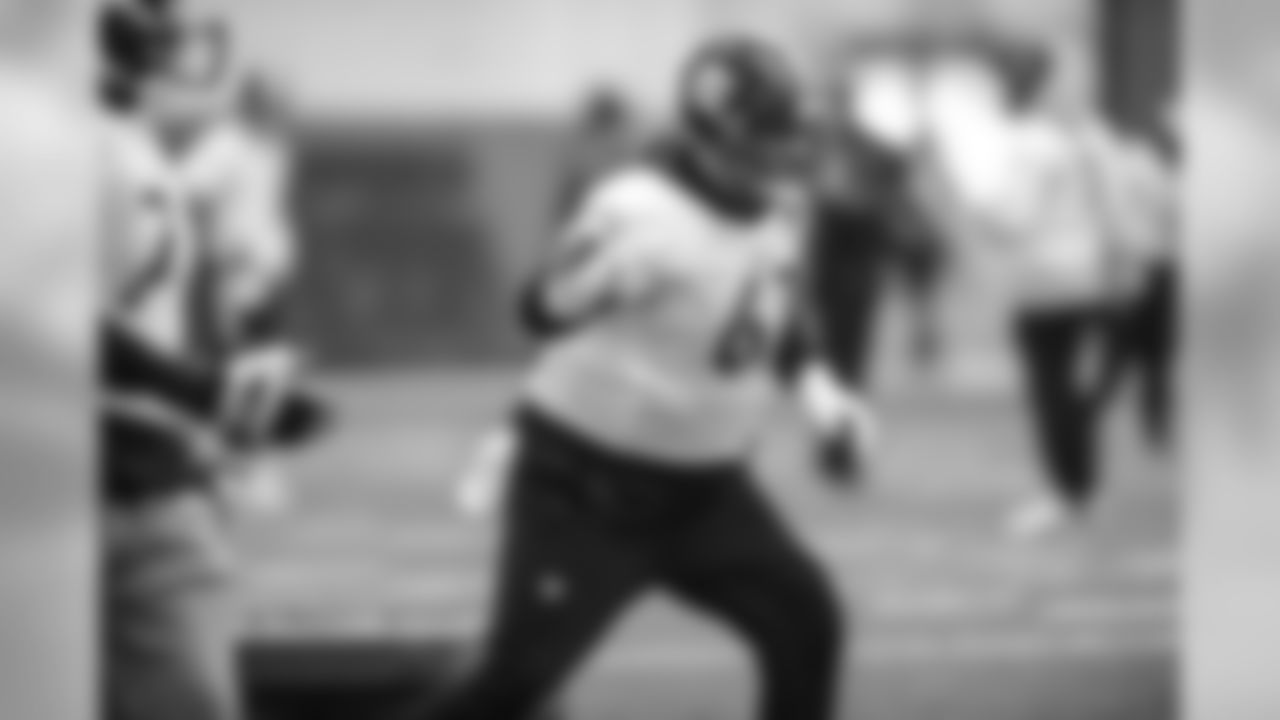Q. I'd like to take you back to a situation in the fourth quarter last week against the Ravens. It was second-and-8 from the Ravens 28-yard line, there were 56 seconds left, and they had just called their second timeout. You needed a field goal to win. Instead of making them use their last timeout and running the clock down for a walk-off field goal attempt, there were two pass attempts, both incomplete, and the Ravens got the ball back with 42 seconds and a timeout after Chris Boswell's 46-yard field goal. What was your thinking there?
A. The critical element is what you said at the end – a 46-yard field goal was no given. We knew they would be packing the line of scrimmage in an effort to maybe make the 46-yard field goal a 47-yard field goal or a 48-yard field goal if you maybe get dropped for some minus-yardage plays. We'd had a lot of success throwing the ball that night. We weren't going to get scared and change our personality and succumb to convention. We stayed in the mode that we were in, because we had a lot of success doing it. Unfortunately, in those two instances we had two incomplete passes, but the thought process, the means in which we approached the situation I'm unashamed of and would do it again based on the circumstances I just described for you.
Q. Is that a decision that's made in that moment?
A. Absolutely. Particularly when I acknowledge I'm going outside of convention, it's a feel, it's a gut, it's the flow of the game.
Q. This week is the most anticipated matchup of the NFL regular season: Steelers-Patriots. What have you seen from your team during the days of preparation?
A. It's been a good week. It's a fun week from a coach's perspective when you play in these five-star matchups. You have the attention of the guys. They're duly motivated and focused in terms of preparation. Often times when I'm faced with weeks like this, I stand back at a distance and just enjoy the sounds of preparation – the formal communications at the line of scrimmage, the detail in which guys communicate post-play and post-period. It's an enjoyable week from my perspective when you're in these big ones.
Q. Has their demeanor been any different?
A. No. I think that's the difference. The level of professional chatter is increased. You feel the difference. You feel it in the playoffs. You feel it in Super Bowl preparation. The informal discussions about football that are going on when they're not at work. When the offense is on the field, the informal conversations that you hear from pods of defensive players, or little instances of things they're working on standing on the sideline. And virtually the same thing when the defense is on the field, Ben will have the technology on the field and they'll be looking at the video of the plays they just ran, and you'll see AB and a few of the receivers gathered around him. They're just fine-tuning and detailing their work because they realize that possession downs in these moments are all critical in determining the outcomes of big football games.
Q. Do you believe it's possible in the NFL for one team to have another team's number, so to speak?
A. The circumstances of groups change so much year in and year out, it's difficult to say. I can acknowledge that teams beat other teams repeatedly, but often times the mode in which they do it or the means in which they do it change, because the variables change. The key components – the players and so forth in the era of free agency and the development of players and also the decline of players – changes that so often.
Q. These teams have met four times in the last five years, and the Steelers are 0-4 in those games. Can you use that to the team's benefit, or does it work the other way where you're concerned about the team's level of confidence that it can actually win.
The Steelers prepare for the Week 15 matchup against the New England Patriots.








































A. I think all of that is individual, meaning that some guys might be highly motivated by the fact we're 0-4 against them in the five years; some guys might not care; some guys might be intimidated by that. To paint with a broad brush and say that there's a global approach to addressing something like that is just kind of naïve. It's each man. The bottom line is that each game stands on its own. We cannot make up for time spent. We better focus on this opportunity in this game, and that's generally my message, whether it's about this specific instance, or, you know, a sequence of events where we've dominated guys repeatedly, like the Bengals for instance. I often get questions like, when is that run going to come to an end? My answer is, why does it have to? Each game stands alone. We have to prepare and win this one. We don't have a continuation of the ones that we won or lost prior. It's all the same. If guys are really professionals, they're focused on this opportunity and this opportunity alone.
Q. Maybe more than any other game on your schedule this season, the outcome of this one is going to be attributed to the job the coaches of each team did. Can coaching make a difference in a game like this?
A. Coaching makes a difference every week, and that's why we work the way that we work. I know that's why I do. To suggest that my contributions are insignificant, I'm not going to be in that line. The coaching decisions are very important. In fact, the compensation for the coaching decisions are very important (laughs).
Q. In what ways can coaching decisions on game day make a difference?
A. It's baffling to me that all of a sudden, in games like this, coaching becomes significant. It's an element of it every week. The strategic approach to planning, the matchups and everything, it's no different or no more important this week. It's important every week.
Q. What are the characteristics of a Bill Belichick team?
A. A highly-specialized division of labor. Diverse personnel groupings on offense, defense, and special teams. They utilize all 53 players, or 46 on game days. They have very specific jobs and tasks relative to the positions they play, and that's evident when you watch them play, because you routinely see people do similar things in the midst of schemes that may change.
Q. Do the Patriots win year after year by being consistent in what they do and how they try to do it, or are they a team that's constantly changing what they do and how they do it?
A. They're continually changing what they do, but largely the people within it don't change. In terms of schematically, globally, you might be addressing different things from them, but what they ask people to do, they ask people to do. And they find ways to keep it simple for them as individuals, but it's changing collectively. And I think that's one of the best things they do – they present different things to you week in and week out, but they're not necessarily new things to the individual players in terms of the things they're asking them to do.
**
Q. Rob Gronkowski is the best tight end in football. How does the matchup problem created by a dynamic tight end impact the scheme of a defense?**
A. It's more than just his skill-set and the fact that he's dynamic. It's also the pinpoint accuracy of Tom Brady. When you watch him perform, he's big, he's got a great catch-radius, he's highly competitive, but when all of those things fail and he's closely covered, Tom is still capable of throwing him open. I think that's the discussion when you're talking about Gronkowski and his impact on the game – that you can seemingly do a good job against him and he can get the ball anyway, because of the pinpoint accuracy of his quarterback.
Q. Is there a single quality that separates Tom Brady from the NFL's other great quarterbacks?
A. I think it's that accuracy. His pinpoint accuracy and quick decision-making, coupled with unique experience. Let's be real here – 18 years is unique experience. Anybody doing something for 18 years at the professional level in the same place – he's been pulling into the same parking lot for 18 years – has got to stand for something, and it's very evident in his play that it does.
Q. Do you see this game in any way as being a Ben vs. Brady competition?
A. I wish it was. It would be simple. The bottom line though is that in any matchup, there are layers to it. It's fashionable to make it Ben-Brady, or me and Bill, or what have you, but there are many layers to it. It's untold who the significant components are who are going to get the winning team out of the stadium. It might come down to James Develin vs. Rosie Nix. The most functional fullback who will play 10-12 snaps of offense and cover kicks, because it's that highly specialized. We have a fullback who plays some offense and is capable of being impactful on the offensive game plan from time to time, and when he's not doing that he's covering kicks very effectively. They have one of those, too, and his name is Develin.
Q. Could it be harmful in any way, if some of the principles in this matchup see the game in that way – if Ben sees it as a competition between him and Brady, or if you see it as one between you and Belichick?
A. Speaking for myself anyway – and I'm sure Ben sees it the same way – I'll use whatever motivational tool necessary to get myself in the frame of mind to do the job. If I need to convince myself that I need to out-strategize Bill to win the game, I'm sure Ben feels the same way. Whatever we need to do to win the game. Ben knows he's going to have to make significant plays for us to win this game. I know I'm going to have to make good and timely decisions to win this game.
Q. When the game is over, which statistic do you believe will be the one that will have had the most impact on determining the winning team?
A. It's the turnovers, but not in the ways you think. Last week, we're playing Baltimore and they get turnovers in bunches. They're a significant turnover group. This Patriots group doesn't necessarily get turnovers in bunches, but the ones they get are significant, because their offense does not turn the ball over. Tom Brady has thrown six interceptions on the season, two of which occurred last Monday night. That's why they lost that football game to the Dolphins. They were faced with something that doesn't generally happen to them – turning the ball over. They were a minus in the turnover game. The turnover game is big. If we can find a way to get the ball from them, we need to protect the ball, it's going to be significant.














